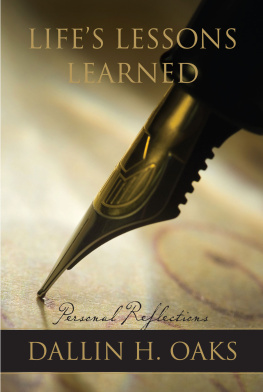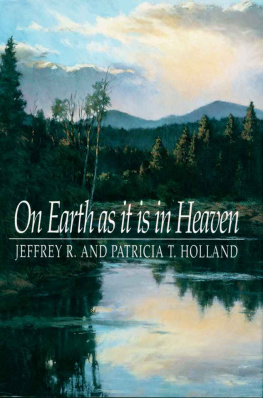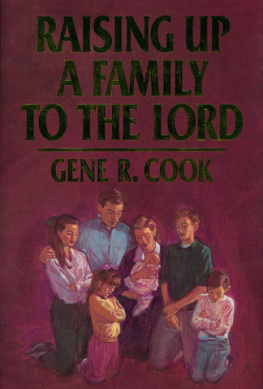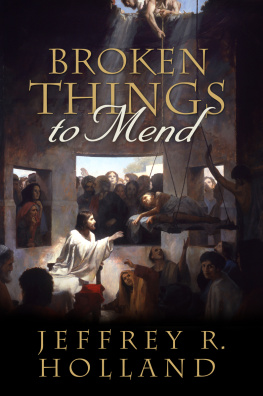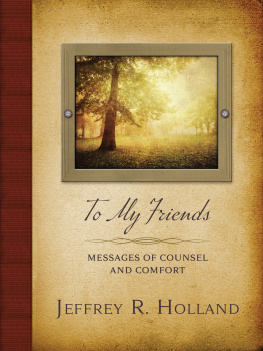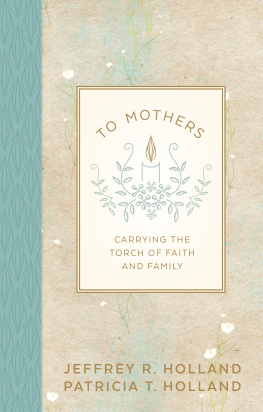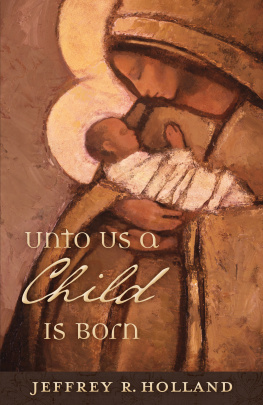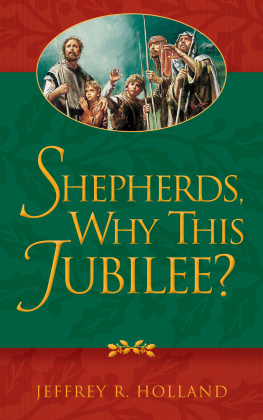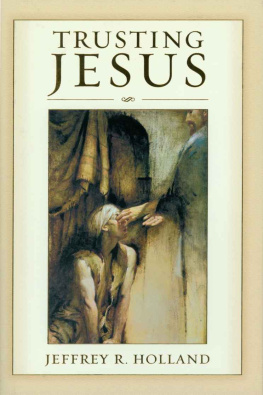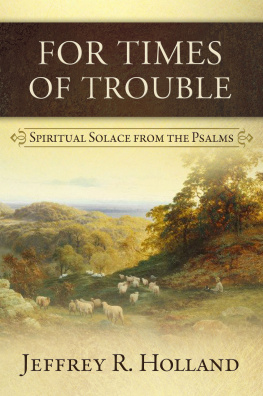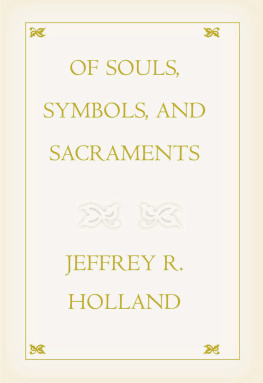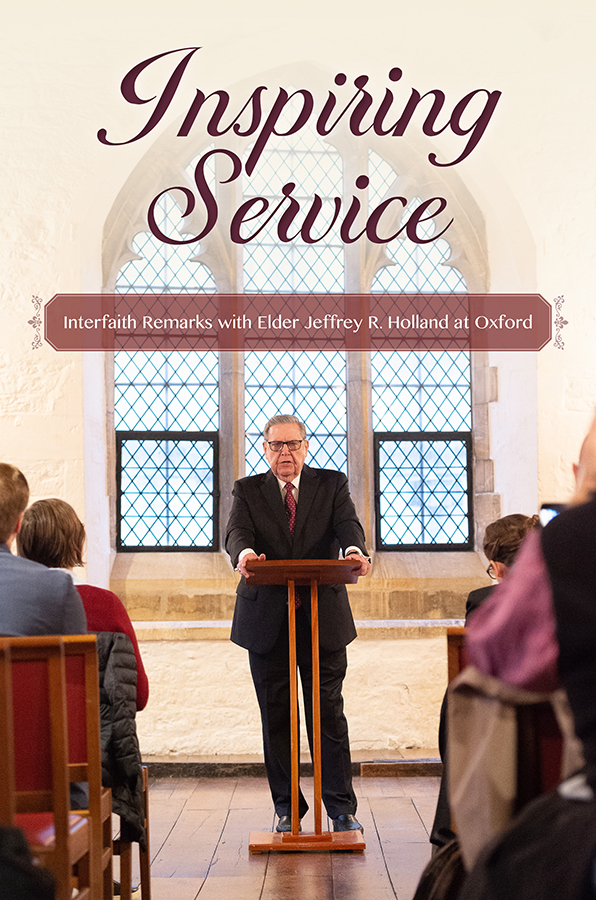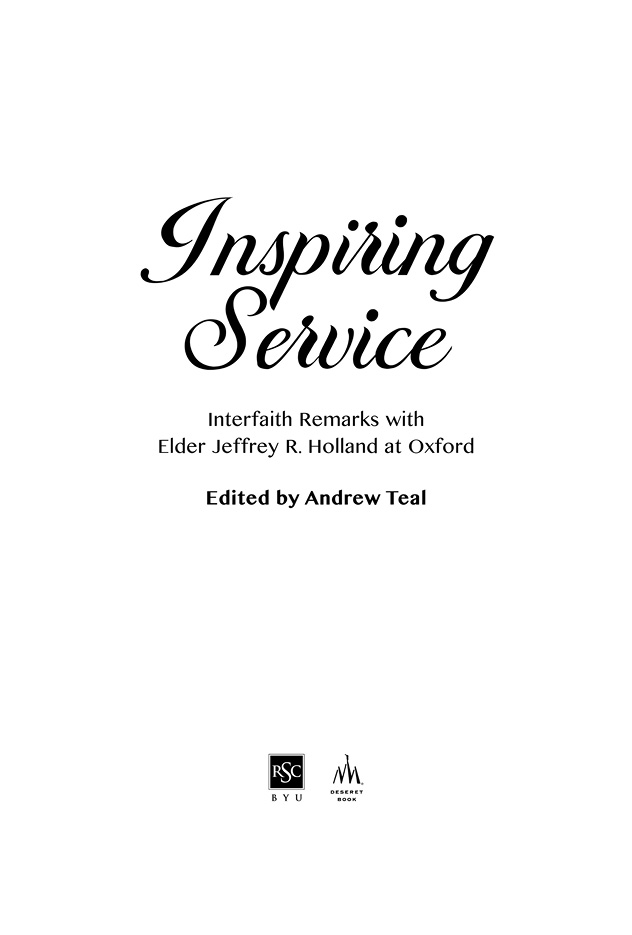Published by the Religious Studies Center, Brigham Young University, Provo, Utah, in cooperation with Deseret Book, Salt Lake City, Utah.
Visit us at rsc.byu.edu.
2019 by Brigham Young University. All rights reserved.
Printed in the United States of America by Sheridan Books, Inc.
deseret book is a registered trademark of Deseret Book Company.
Visit us at DeseretBook.com.
Any uses of this material beyond those allowed by the exemptions in US copyright law, such as section 107, Fair Use, and section 108, Library Copying, require the written permission of the publisher, Religious Studies Center, 185 HGB, Brigham Young University, Provo, Utah 84602. The views expressed herein are the responsibility of the authors and do not necessarily represent the position of Brigham Young University or the Religious Studies Center.
Cover and interior design by Emily V. Strong.
All images are courtesy of Simon D. Jones.
Cover image: Elder Jeffrey R. Holland of the Quorum of the Twelve Apostles speaks about the beliefs and doctrines of The Church of Jesus Christ of Latter-day Saints at the University of Oxford. Courtesy of Simon D. Jones.
Library of Congress Control Number: 2019911493
eBook ISBN | 978-1-62973-929-8
W e acknowledge with gratitude the cooperation and generosity of many in enabling the visit of Elder Jeffrey R. Holland and Sister Patricia Holland to Oxford in November 2018.
The Church of Jesus Christ of Latter-day Saints has been consistently generous in its kindness, flexibility, and significant, continued support of the project.
Thanks are due to Oxford Universitys Faculty of Theology and Religion and to Professors Keith Ward, Carol Harrison, and Joel Rasmussenamong many othersfor support and participation in this project.
In addition to the speakers who contributed to the panel discussion, we are grateful to the University Church of St. Mary the Virgin and its vicar, the Reverend Dr. William Lamb, for hosting the presentation by Elder Holland and the response by Andrew Teal. Additionally, we are grateful to Paul Kerry for chairing that event.
Thanks also go to Pembroke College Oxford, which hosted the large audience at the presentations; to the Rev. W. N. Monteith Charitable Trust for their donation; and to the porters, events staff, chefs, and hall staff of Pembroke College, who are all thanked sincerely for their hospitality and considerable hard work.
The choir, organist, and choir director of the Damon Wells Chapel are thanked for their welcome and contribution in presenting Nine Lessons and Carols as the context for Elder Hollands Christmas Comfort address.
Special thanks are due to Professor Richard Williams of the BYU Wheatley Institution for the artwork and publicity, to Professor David Kirkham of BYU London Centre for transport provision, to the Programme for the Foundation of Law and Constitutional Government at the University of Oxford Law Faculty, to BYU International Centre for Law and Religious Studies, and to Professor Brett Scharffss support of the panel banquet. The transformation of a series of public events into a book has been possible only by the skillful industry of the BYU Religious Education Faculty Support Center, student employees who created typescripts, and the Religious Studies Center staff who edited, designed, and published the book, among them especially Scott C. Esplin, R. Devan Jensen, Brent R. Nordgren, Emily Cook, Abigail Crimm, and Emily V. Strong; thanks also to Rachel Teal and Chris Long for their skills and suggestions.
Most significantly, thanks are due to Paul Kerry for his continued support, expertise, and meticulous attention to detail in arranging, checking, and enabling the event and publication. It is acknowledged with profound admiration and respect and sincere thanks for his love, service, and capability, without which neither the Inspiring Service events nor this book would have come to fruition.
May this work testify to the generosity and faithfulness of God, contribute to the reconciliation of Christian communities represented herein, and mark a significant step in the development of beautiful friendships and respectful theological explorations.
Andrew Teal
Introduction
Andrew Teal
The Genesis of an Idea
I begin with a disclaimer. It is all the more interesting, moving, and challenging to dive straight into this volumes records of an extraordinary weekend in Oxford towards the end of Michaelmas term in 2018 than to begin bogged down in this introductory description, commentary, and agenda. I am persuaded to submit an introduction only on the understanding that readers are forewarned that it is a retrospective reflection that aims to give some context to the event, to offer some reflective commentary on the sessions, and most of all to invite us to look forward, presenting some outcomes. In that sense, better an introduction than a conclusion.
The notion of a panel of speakers from across Christian traditions emerged through friendship. Matthew Holland, then the president of Utah Valley University, spent a term as a visiting scholar at Pembroke College Oxford; he was very good news and someone adept at initiating fruitful conversations across the University of Oxford and further afield. As a result, I was delighted to be part of a meeting of faith leaders exploring the plight of the Yazidis, where Elder Jeffrey R. Holland and Sister Patricia Holland joined Baroness Nicholson, Bishop Alastair Redfern, Lord Alton, and many others to be in solidarity with religious freedom in general and the Yazidis community in particular.
In conversations there, especially with Paul Kerry, two other concerns emerged:
- How might we find ways of inspiring students and young people to take to heart a sense of vocation rather than merely an oppressive awareness of the large amount of student debt to be managed after they graduate? In other words, how could we unleash and energize a sense of vocation ?
- There was some reflection about the place of worship and college chaplaincy in higher education, in particular howin the college chapels of Oxford and Cambridgebeautiful, aesthetic experiences are so often limited to fleeting emotions without encouraging a profound engagement with the substance of faith and its capacity to reach deeply into, and transform, the human condition. It was agreed that as marvelous as it was that literary and musical accomplishments celebrated human creativity and beauty, enabling the possibility of meaningful pastoral connections, the spontaneous desire to share the greatest gift, that of faith in a loving God worthy of the outpouring of such worship, was hard to convey and sometimes even avoided and treated as an embarrassment.


